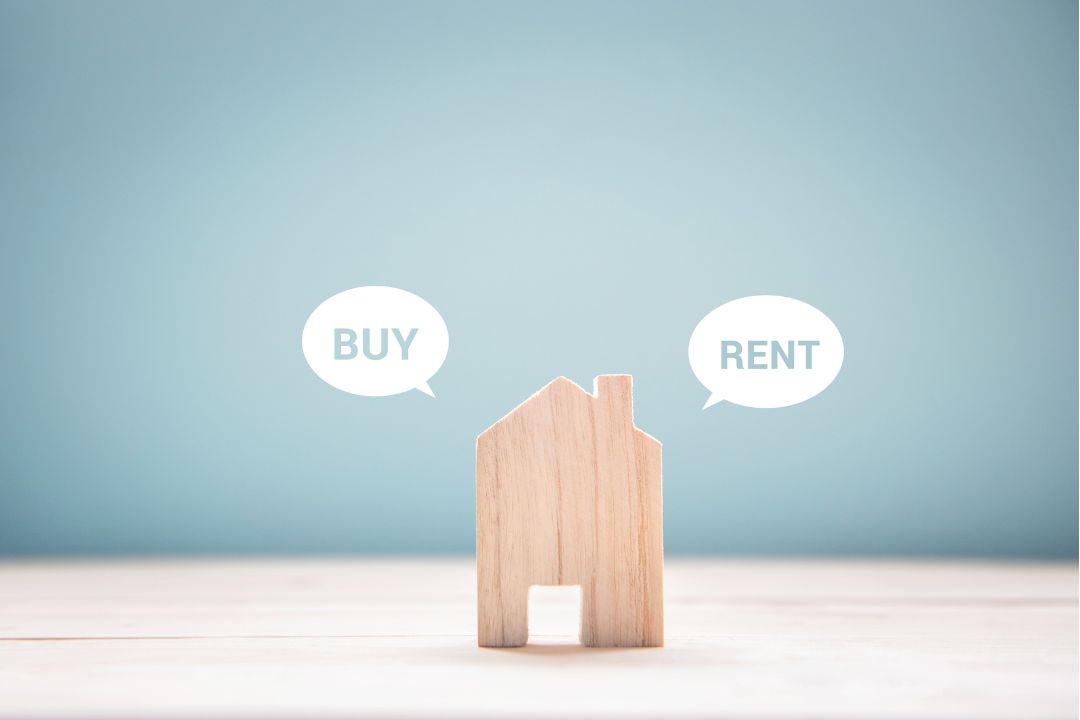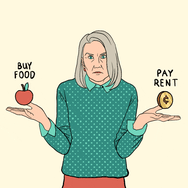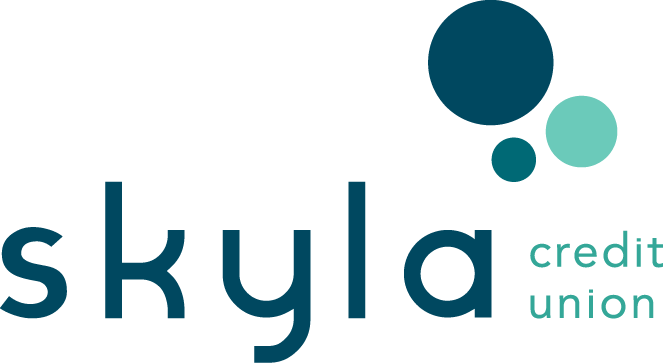Is it More Beneficial to Rent or Buy a House in 2025?

It's the age-old question: is it better to rent or buy a house? And with rising housing costs and interest rates, it's a question that more and more people are asking themselves, especially if you're ready to move out of your parent's home or just looking for a new location. So… what's the right answer?
There are pros and cons to both renting and buying- and the best decision for you will depend on your unique circumstances.
- Are you financially ready to buy a house?

- Are you ok with renting a space where there are restrictions on what you can do in your place?
- Are you prepared to maintain a property and keep up with repairs?
- Is there a chance you might be ready to move in the next few years?
As a homeowner who used to be a tenant Someone who occupies land or property rented from a landlord for more than 11 years, I can tell you what I've experienced on both sides of the spectrum. With these questions in mind, we'll explore some of the key factors to help you make an informed decision if renting or buying a house would be a better option for you!
here's a quick look at what we'll cover
|
|
 renting
renting
Rental properties offer certain benefits over buying a house, such as cost-effectiveness and flexibility. While there are many advantages to renting versus owning property (like being able to move in or out on your timeline relatively easily), one major drawback is that you're at the landlord's mercy if the situation doesn't work out--you can't just go back home anytime! Here's a closer look at the advantages and disadvantages.
Advantages of renting
- You're not responsible for repairs or maintenance. The landlord takes responsibility for handling this. If you're in a rental now and if an appliance is not operating properly, notice leakage in your ceiling - contact your landlord.
- Rent is often cheaper than a mortgage payment.
- More location options available. Renting gives you more options in location (like an apartment building in the coolest part of town or closer to your work) opposed to homeowners who are restricted to locations they can afford to buy.
- More flexibility to move in or out. Unlike houses, you can easily move in or out much more quickly.
- No need to pay a large sum of money up front: When buying a house, you'll need a large sum of money for down payments, inspections, closing costs, etc.
- No real estate or property taxes. This cost could come out to thousands of dollars per year when buying a house. luckily this is not expected when renting.
- Typically lower utility costs. This of course is based on the size of your home, but utilities cost less for a smaller apartment rental than it is for a house. Psst... my utility bill now as a homeowner is a couple hundred dollars more than when I rented my townhouse in Greensboro, NC.
disadvantages to renting
- Not building equity. Renting can feel like you’re just throwing your money down the drain every month since you’re not building an equity like you would with owning.
- You could be trapped in an apartment with rude neighbors
- Pay extra for pets: Not a lot of landlords offer a pet-friendly home for tenants. This could be due to the extra work like clean up that may be involved but it's possible if there are pet-friendly places for rent, the landlord may charge you more for rent.
- Rent can increase each year. Since the landlord owns the land, they can raise rent anytime. For me, my rent would increase at the beginning of each lease renewal. I hated it
- You may have to move if the landlord decides to sell the property.
QUICK TIP: Depending on your situation, renting can give you more flexibility than owning a house. If you suddenly need to move for work or because your family is expanding, it’s much easier to do when you’re renting rather than owning. Breaking a lease may be simpler than paying more money on a new house if you're currently a homeowner. |
 buying
buying 
When you become a homeowner, there are certain things that you immediately have to start thinking about. For one, home maintenance and repairs are now your responsibility, so you will need to build up a savings account for emergency home repairs and typical home maintenance tasks like HVAC filter changes and annual cleaning of the gutters.
QUICK TIP: Have an emergency savings fund? If not, I have tips to help you build one. Here you go. 7 Steps to Building an Emergency Savings Fund. |
Here's a list of advantages and disadvantages when it comes to buying a home.
Advantages of buying a house
- Less likely to have noisy neighbors. You may not have to worry about noisy neighbors or landlords breathing down your neck over petty issues.
- You can personalize the property however you see fit. When you're a homeowner, there's no need to get permission from anyone on what to do with your property. Psst... unless you live in a community with a Homeowners Association. Then there may be a little restriction depending on the organization
Psst Some residential communities come with HOA organizations- Homeowners Association is an organization that enforces rules for properties and residents. But can help maintain the property's value and be an added layer of support if you need it.
When finding a home, look out for HOAs and their fees. Some HOA fees cost more than others. - House will benefit you. If you make mortgage payments, each payment will go towards you owning the home and not the landlord's pockets.
- It may make sense to buy soon.
Since interest rates are increasing, buying a house soon could mean you can get a better interest rate now rather than waiting and having rates rise again. - Buying a home can mean stability for you and your family.
disadvantages of buying a home
- The monthly mortgage could cost more than a rental.
- Costly general repairs and maintenance. Be ready to tackle maintenance and repairs like mowing the lawn, repairing the roof if its damaged, repairing or replacing HVAC units if needed, and the list of home repairs can go on and on. Repairs can be very costly.
- No landlord to fix the problem for you. being a homeowner is your responsibility.
- Buying a house can take a huge chunk of money upfront. It may be harder to afford if you're not financially ready for a house.
- More miscellaneous costs and payments. When getting a house with a mortgage you have other costs on top of a monthly mortgage, you have closing costs, inspections, moving costs, and more that are immediately due when getting a house. Here's a list of costs that comes with buying a home so you're better prepared.

Keep in mind that when having a home, most home insurance policies require that homeowners take certain safety precautions in order to qualify for coverage - things like installing alarms, fire suppression systems, and lightning rods could all be expected of a homeowner.
Ultimately, when buying a home or an apartment, you need to carefully weigh all of your options and do your research before making any final decisions.
QUICK TIP: There is nothing wrong with not buying a house. Really! |
There's a societal pressure that you have to be a homeowner. Yes it may make sense to buy a house but you might have no interest or ability for maintenance or yard work or upkeep. Maybe paying a little more in rent isn’t a deal breaker. And that's okay! You know what's best for you and your family.
 when does it make sense to rent or buy a house?
when does it make sense to rent or buy a house?
There is no easy answer to the question of rent vs buying a house, as it depends on several different factors. For some, buying a home may be financially viable and make sense in the long term. This can be especially true if you are able to secure a low-interest rate and take advantage of tax breaks. Additionally, owning your own home can give you greater stability and security and offer other intangible benefits like emotional satisfaction.
However, for others, renting may make more sense. Maybe you aren't ready to settle down and don't want the commitment of owning property right now. Or perhaps you are looking for maximum flexibility when it comes to where you live or which amenities your home has. Or, it could just be too expensive to pay the closing costs and down payment up front.
When considering your options, make sure to review these factors when making a decision:
 factors to consider when deciding to rent or buy
factors to consider when deciding to rent or buy
how are your finances?
Are you financially ready? Buying a house typically costs between 15-30% of your annual income, depending on where you live. If you don’t have that much saved up, you may need to take out a bigger mortgage amount (especially if you’re not able to make a down payment.) Doing this can add years to the amount of time it will take you to pay off your home.
Want to know more about the costs of buying a home? I have just the article for you!
how long do you plan on living in the home?
When you buy a house, are you committing to staying in that place for a minimum of 3-5 years? If you think you might move within that time frame, it may not be worth it to buy a house since the costs you'll have to put out on the house upkeep in a short time frame may not be worth buying.
If you're renting, are you looking to rent long-term or short-term? The standard lease agreement is usually for one year but can typically be renewed. If you're looking to rent long-term, then it might make more sense to buy a property. I'm sure you don't want to feel like you're throwing your money away every month.
Renting an apartment is typically much less expensive than buying a house. You can usually find apartments for rent for around $2,000 per month. Of course, this depends on where you are. For example, rent in New York is $2,268 according to Apartment lists April 2024 New York City Rent Report.

where will you be located?
If you're questioning if location plays a role in whether to rent or buy? Peep the Apartment List Cost of Living in North Carolina 2023. You'll see a difference.
When it comes to renting or buying a home, location is an extremely important factor to consider. For example, if you are looking to rent, you will want to focus on neighborhoods that offer good access to public transit, amenities like shops and restaurants, and other key services like schools and healthcare facilities. This will help ensure that you have easy and reliable access to the things you need daily.
On the other hand, if you are thinking about buying a home, it is important to take into account factors like commute times, property values in the area, and any existing development plans for the local area. These considerations will help you determine whether or not the potential investment is worth it based on where it is located.
why are you looking to rent?
Renting requires much less maintenance than buying a home. With a rental home, you don't have to worry about routine repairs, property upkeep, or unexpected disturbances like leaks or flooding. Additionally, rent gives you more flexibility when it comes to your living situation; you can move whenever you want, and you don't have to worry about selling your home if you decide to relocate for work or family reasons.
Some people enjoy the easy lifestyle and low maintenance of renting, while others prefer the sense of stability and control that comes with owning their own home.
why are you looking to buy?
For many people, the answer is simple: they want a place to call their own. They want to be able to and put down roots and have a space that is entirely their own
Others may be motivated by the potential for financial gain. Investing in property can be a great way to build long-term wealth, but if you don't have a plan in place to cover high fixed costs, buying may not be a good investment.
Make sure you're ready to pay for unexpected costs
what's next?
Ultimately, when renting or buying a home you need to carefully weigh all of your options and do your research before making any final decisions.
- Do you know where you want to live? do you need a flexibility and desire to travel often? If so, renting might be a better option. Aside from flexibility, keep in mind that location is an extremely important factor to consider. Property taxes, the cost of homes may cost depending on the location you may be interested in.
- Do you know what you can afford to buy?
- Can you afford home repairs and maintenance costs? To help you understand the costs that comes with buying a home - I have the perfect article for you.

Want to talk this through?
Our Mortgage Loan Officers are here to help! You can send an email or give us a call at 704.375.0183 x 1525.
As Content Strategist behind the Learning & Guidance Center, Yanna loves showing just how doable finance can be. Whether it’s simple tips, step-by-step guides, or comparison charts, she’s passionate about helping readers take charge and reach financial freedom with confidence
more resources for your home buying journey
What Are the Costs of Buying a Home?
Don't know the costs that come with buying a home? Other than the monthly mortgage, here are some other costs you should be prepared to cover as a homeowner.
11 min. read
7 Steps to Building an Emergency Savings Fund
Don’t know where to start when saving for an emergency fund? Here is how you can save for an emergency with effective tips for anyone who isn’t prepared...
8 min. read


